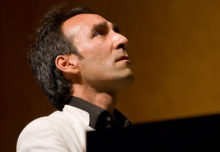 Philippines Business World magazine: Arts and Leisure
Philippines Business World magazine: Arts and Leisure
Music : The key to pianist Tristan Lauber’s life
Edited by Alicia A. Herrera
If chasing villains, building space laboratories on Mars, and saving the earth from evil intergalactic space monsters are a typical little boy’s dream profession, then that alone makes Canadian concert pianist Tristan Lauber something out of the ordinary.
“I’ve never imagined myself doing anything but playing the piano,” Mr.Lauber admitted. “Of course , when I was a kid, I read comic books. I watched action movies. I loved cops and astronauts. But, myself, I never wanted to work in any of those professions.”
Today, included in his growing list of awards are three first prizes: one in the provincial finals of the Canadian Music Competition, another in the national finals of the CIBC Music Festival (chamber music), and the third at the Trois-Rivieres Smphony Orchestra competition. He also won the Grand Prize at the Quebec Music Competition.
“My father, who is trained as an engineer, of course, like many fathers, would have preferred if I had become something other than a musician, ” Mr. Lauber confided. “the nice thing, of course, is that now that he sees I’m doing well, he’s very proud and he has no regrets about letting me do what it is I wanted to do.”
He started relatively late for a pianist; at the age of nine and without a teacher. His mother bought him a piano after seeing how strong his interest in the instrument was. For a year, he was content with practice pieces. Formal instruction came at the age of 10 with his first public performance following shortly after a year at the Pollack Hall of McGill University. The concert was in celebration of Canadian composer Otto Joachim’s 70th anniversary. The show was subsequently aired on the CBC network and led to Mr. Lauber’s first recording of the composer’s “Twelve Tone Pieces”.
“My mother is a composer – a very well-known Canadian composer. She was, of course, a very important influence. She did not teach me because she is not a pianist or a piano teacher, but she played for me when I was a child. She used to play my favorite classical pieces and that’s one of the main reasons why I developed an interest in classical music.
“I also credit my father for a different reason. He is not a professional musician. But he is Vietnamese and he, like many Vietnamese, is very musically inclined. So he and all his brothers play the electric guitar and they play it very well. In fact, that’s how he met my mother. She met him when he was playing rock guitar with a band in Switzerland. This was the ’60s, of course, so he had long hair and he played Beatles.
“I credit him with giving me the desire to perform on stage. Although he does not play professionally, he has put on impressive shows for the Vietnamese New year in Montreal. He used to practice for hours and hours with his rock band in our basement. It was so loud that the glasses would shake on the table!”
Admittedly, with the advances in technology, the music world is shifting at a speed that artists before never had to contend with. A peek at the record stores would reveal how music alone is no longer enough to grab the listener’s attention. Undoubtedly, it is still the bottom line but the music must also be marketed in a visual sense to convince the audience to listen. And these factors, Mr. Lauber agrees, add to further complications.
“The music world is changing dramatically. It is becoming more and more difficult for classical artists to survive because the market suffers from various things. One of the main problems, of course , is expenses.”
The foremost consideration is always the audience. You have to know your market. It is necessary to be flexible and versatile. But it is more important to be true to yourself, to find your own niche-a repertoire that suits your personality.
For his visit to the Philippines, Mr. Lauber researched a bit and settled for a program that he felt would be accessible to a greater number of audience of a mix of cultures.
“I have always been very impressed at how musical the Filipino people are. I have spent just a few days at the campus of UP (University of the Philippines, Diliman) but I’ve already heard through the walls some of their choirs practicing. It’s scary! They are good. They are very good and they have a lot of choirs, too. Just yesterday, we went to an Italian restaurant and I was blown away by the fact that there were two people who were having their birthday yesterday and they had an instrumental recording of ‘Happy Birthday’ and all the waiters-about 10 to 15 of them-sang ‘Happy Birthday’ to the patrons. It’s hilarious but it’s wonderful! It just shows how all Filipinos are musically inclined. They sing a lot which is very welcoming and touching to hear.”
Eventually, he hopes to learn Filipino compositions to add to his repertoire. This was his second visit in Asia but only his first in the Philippines.




